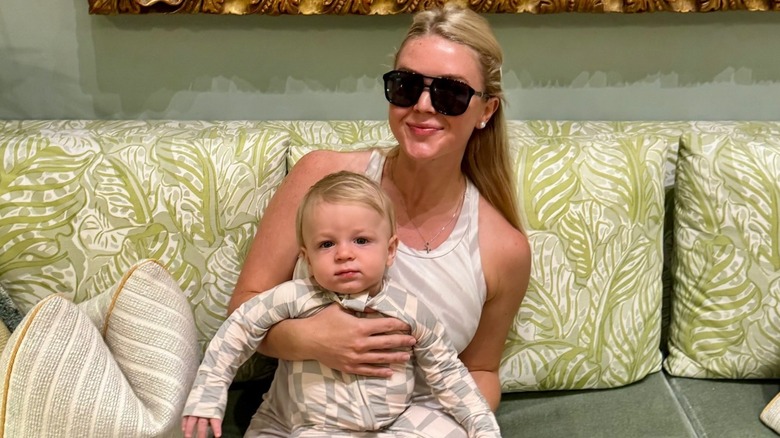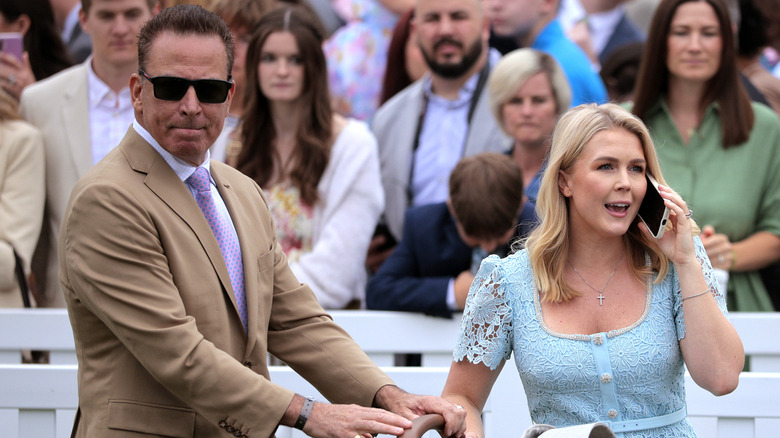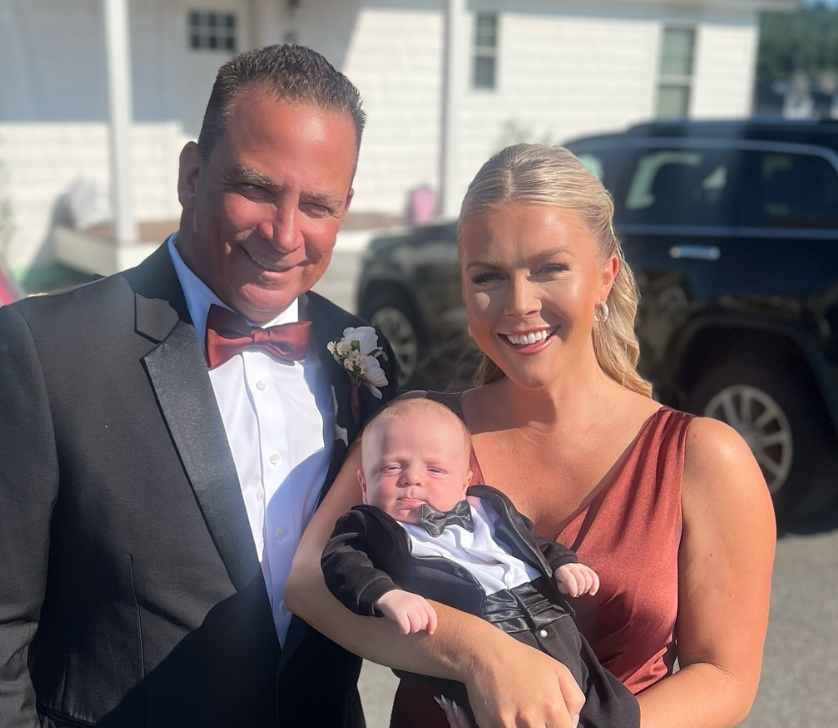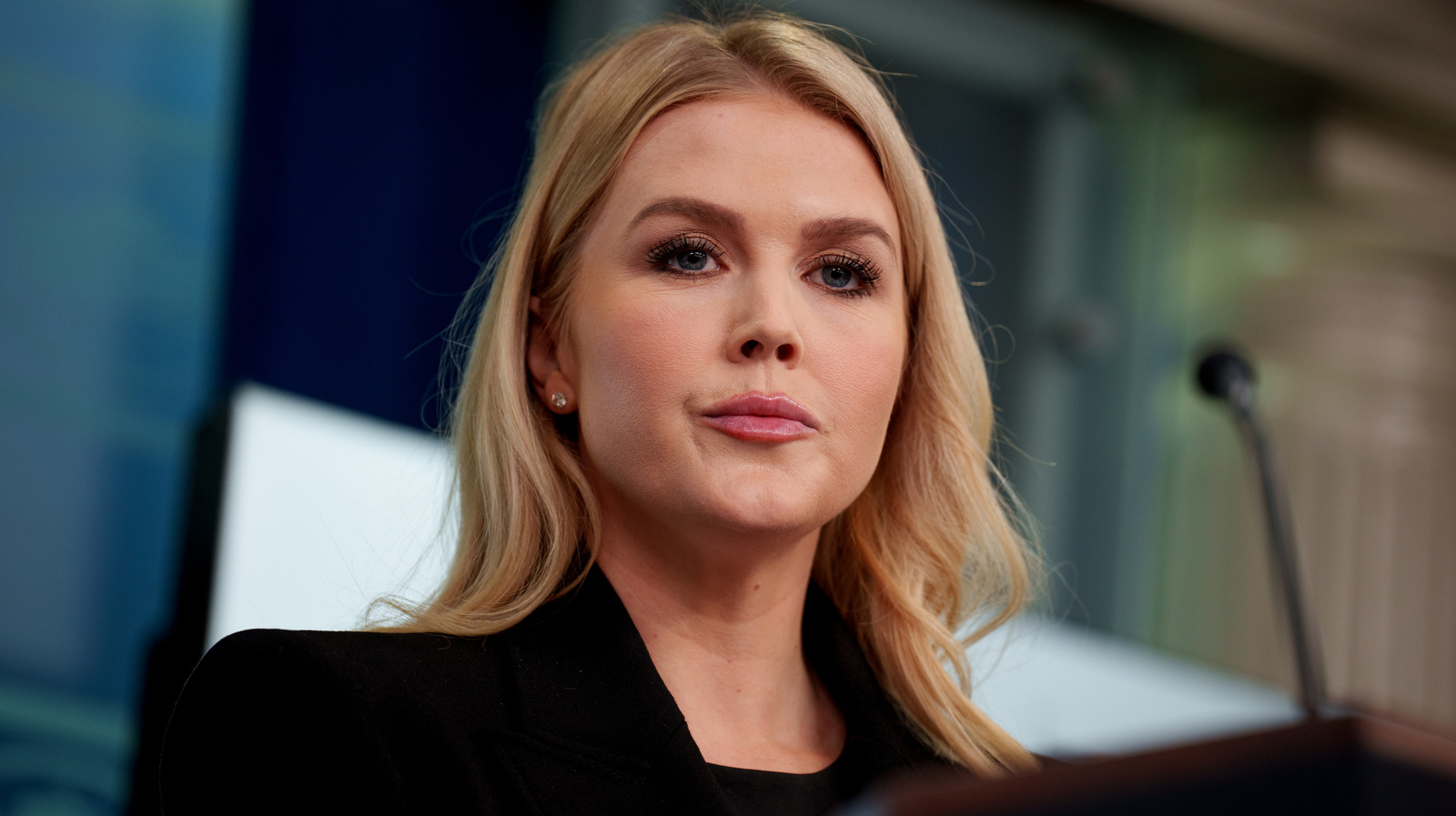Karoline Leavitt, the White House press secretary under President Donald Trump, is once again at the center of public scrutiny—this time not for her political messaging but for her personal life. Her marriage to real estate investor Nicholas Riccio, who is 32 years older than she is, has sparked renewed debate after Leavitt’s latest comments on the “Pod Force One” podcast. Although Leavitt has always insisted that her relationship is genuine and rooted in emotional compatibility, critics online have seized on the significant age difference and the couple’s wealth, reviving accusations that her marriage is financially motivated. These claims remain purely speculative, voiced by social-media users—not by Leavitt, Riccio, or any verified source.
The age gap between Leavitt and Riccio has been public knowledge for years. At 27, Leavitt married Riccio, now in his late 50s, and they have spoken only briefly about the origins of their romance. In February 2025, during an appearance on “The Megyn Kelly Show,” Leavitt acknowledged that it was “a very atypical love story,” but she declined to provide further detail. Her reluctance to disclose specifics has helped fuel outside speculation, even though she has never suggested anything unusual or inappropriate about their relationship.
By the time she appeared on “Pod Force One” in November, the topic resurfaced when host Miranda Devine asked more directly about the couple’s beginnings. Leavitt reiterated that the two had known each other as friends for some time before falling in love, describing Riccio as introverted and deeply supportive. Her description remained vague, but this was consistent with her past interviews. She did not frame their meeting as dramatic or mysterious—only private. Still, the lack of detail has encouraged some online observers to fill in the blanks themselves.
After lightly describing Riccio’s personality and their transition from friends to partners, Leavitt shifted to praising his accomplishments in real estate. She cited his success, his business experience, and his financial stability as factors that make their family life easier. Although she likely intended this as praise for her husband’s established career and his ability to support her demanding role in the White House, some listeners took her comments differently. As soon as clips circulated online, critics began accusing her of emphasizing Riccio’s wealth too conveniently.

On X (formerly Twitter), users began posting sarcastic remarks accusing Leavitt of marrying Riccio for financial reasons. These allegations were entirely speculative and came only from social-media commenters—not from any evidence or firsthand account. One user wrote, “She fell in love alright. With his bank account.” Another joked, “He has a picture of Karoline in his wallet. Karoline has a picture of his wallet in hers.” Dozens of similar comments followed, forming a wave of gold-digger accusations that spread rapidly through political commentary accounts and gossip pages.
These comments were not grounded in any factual reporting, but they reflected how suspicious some viewers became after Leavitt’s interview. The speculation intensified as people noted the public glimpses of the couple’s lifestyle. On Instagram, Leavitt often shares travel photos, snapshots of expensive furnishings, and images of high-end accessories—displays that are common among influencers and political families alike, but which critics used to reinforce their theories.
One particular photo, showing Leavitt carrying a Louis Vuitton shoulder bag reportedly worth more than $4,800, drew a wave of sarcastic reactions. Commenters framed the accessory as evidence of Riccio’s financial advantage, again ignoring the fact that many people in high-level political or media roles own designer items. Nevertheless, the image became another talking point for those who already believed that Leavitt’s marriage was shaped by financial considerations.

In her own remarks, Leavitt has repeatedly emphasized that Riccio’s career—and the stability it provides—has allowed her to pursue her own demanding professional life. She often speaks openly about the challenges of balancing parenting responsibilities with the high-pressure environment of the White House. On “Pod Force One,” she explained that Riccio’s flexible schedule allows him to take on most of the childcare duties while she works long hours. “He’s built his career, and so he’s in a place where he can support me in mine,” she said. “So he’s an incredibly hands-on father.”
To many listeners, this sounded like the type of arrangement that exists in countless dual-career households. But to her online critics, it became another ingredient in the rumor mill. Some commenters argued that the couple’s financial resources—gained largely through Riccio’s property investments—likely make their lives significantly easier, softening the logistical challenges that many ordinary families face. For example, Leavitt has frequently told interviewers that she returned to work just days after giving birth. While some commenters framed this as admirable dedication, others suggested that most parents would not have the same opportunity without substantial financial support.
Leavitt expanded on her postpartum experience during her interview with Devine. She explained that she had a state-of-the-art television studio installed in her home, allowing her to appear on air between nap times and feedings. “We had a TV studio built in at our home,” she said, “and I stayed home with my baby and hopped on TV in between nap time and feedings.” Critics seized on this detail, arguing that such an arrangement is inaccessible to the vast majority of working parents and is another example of how the couple’s affluence enables a lifestyle far removed from typical American experiences.

Still, none of this provides proof for the gold-digger allegations circulating online. These accusations stem solely from social-media reactions—not from any insider knowledge of the couple’s private lives. What they do reveal, however, is how closely the public scrutinizes relationships with large age gaps, particularly when wealth is involved. High-profile figures whose spouses are significantly older often become targets of such speculation, regardless of the marriage’s authenticity or emotional foundation.
As Leavitt’s prominence continues to rise in Washington, public fascination with her personal life is unlikely to fade. The blend of political visibility, an unconventional age gap, Riccio’s wealth, and Leavitt’s selective sharing about their relationship creates fertile ground for internet gossip—much of it unfair, unverified, and rooted in assumptions rather than evidence.
Whether the criticism will affect the couple personally is unknown. Leavitt has not responded directly to the latest wave of speculation, and Riccio rarely speaks publicly at all. For now, the claims remain what they have always been: commentary from spectators interpreting small glimpses of a marriage they do not actually know.

What is clear is that Leavitt herself appears committed to keeping her relationship largely private. And in an era where every public figure becomes a character in someone else’s narrative, that privacy may only invite more curiosity—and more commentary—whether warranted or not.
